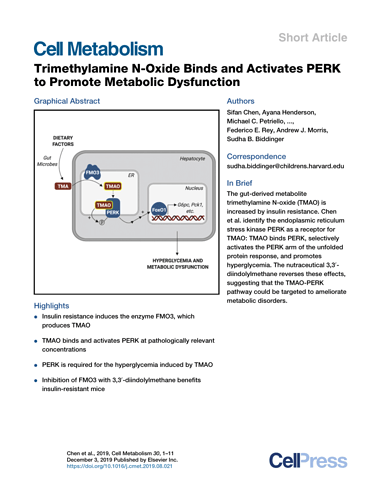@MarkGossage
Nice strawman. 
Swapping out red meat for certain plant-based meat alternatives
Citation needed. Citation needed. Citation needed. (as far as the ‘only’ angle of this.)
…unless you know of another compound or substances that can be converted/synthesized to diindolylmethane in the human body?
…or another compound or substance that can block the FMO3 enzyme directly?
The rumin in cows can also make diindolylmethane but it’s not going to be in the meat your eating…
If you could figure out how to block FMO3 with-out cruciferous vegetables you would be on the cover of Time Magazine! A very difficult thing to do without killing the host!
DIINDOLYLMETHANE: is formed in the body from plant substances contained in “cruciferous” vegetables. These vegetables include cabbage, Brussels sprouts, cauliflower, and broccoli
Trimethylamine N-Oxide Binds and Activates PERK to Promote Metabolic Dysfunction
Beyond meat. Hmm.
Researcher says he advocates wholefoods. But they use Beyond Meat? A plant-based meat alternative that funded the study. Why not use wholefood plant foods to make patties, rather than the industrial processed stuff?
Beyond Meat reduces LDL-cholesterol. LDL-cholesterol is an important factor in a good immune response (1).
Maybe not the stuff to eat during a pandemic.
Not in the slightest. Just showing some “science” that disproves your sweeping statement of “undeniable correlation” . I find it quite simple to deny correlation.
What you’re basically saying is that animals who eat mainly green vegetation don’t have long lifespans. I agree.
straw man
an intentionally misrepresented proposition that is set up because it is easier to defeat than an opponent’s real argument.
You still haven’t disproved the undeniable correlation between eating large animals and short lifespan.
Eating whole foods rich in PUFA’s increases lifespan in conjunction with calorie restriction. This is what the biochemistry is saying.
Err you made this initial claim of an
" undeniable correlation between animals eating large animals and having the shortest lifespans. "
Maybe you’d like to share your undeniable proof of correlation first?
‘But Bunny perhaps there might be another endogenous process that also inhibits the FMO3 enzyme?’
”…Despite the well-documented association between insulin resistance and cardiovascular disease, the key targets of insulin relevant to the development of cardiovascular disease are not known. Here, using non-biased profiling methods, we identify the enzyme flavin-containing monooxygenase 3 (Fmo3) to be a target of insulin. FMO3 produces trimethylamine N-oxide (TMAO), which has recently been suggested to promote atherosclerosis in mice and humans. We show that FMO3 is suppressed by insulin in vitro, increased in obese/insulin resistant male mice and increased in obese/insulin-resistant humans. Knockdown of FMO3 in insulin-resistant mice suppresses FoxO1, a central node for metabolic control, and entirely prevents the development of hyperglycaemia, hyperlipidemia and atherosclerosis. Taken together, these data indicate that FMO3 is required for FoxO1 expression and the development of metabolic dysfunction. …” …More
Perhaps those who have problems with their insulin (like not enough?) i.e. diabetes or insulin sensitivity; cruciferous vegetables (diindolylmethane) might be an alternative?
It’s self-evident unless you know of an animal who eats large animals and has a long lifespan?
Why does mainly eating large animals shorten lifespan? Too much mTOR activation, lack of sufficient PUFA’s, lack of magnesium and meat from large animals has higher amounts of bioaccumulated toxins.
Its obviously so self evident you don’t have a single ounce of actual undeniable correlation?
The fact that a correlation exists does not prove causality. For example, reading skill correlates extremely strongly with foot size, but you can’t possibly imagine that the size of your feet affects your reading ability. The key is, of course, in the confounders, which are age and the corresponding education level.
If you can show that your correlation between lifespan and eating large animals meets Bradford-Hill’s criteria, then we can talk.

I’m not seeing any humans on here thriving on a carnivore diet of large animals. All I hear is wannabe human carnivores complaining of diarrhea.
Whereas the human carnivores I’ve met don’t suffer from that problem.
I know what you’re getting at and this can easily be refuted because older humans tend to have better reading skill.
You haven’t refuted the correlation that is self-evident. What would be a confounder in regards to eating large animals and short lifespan?
I don’t know—and the point is that you don’t, either. At best, the correlation suggests possibilities for further study. Look up Bradford-Hill’s criteria for accepting a correlation as an indication of causality. Then, if you can demonstrate how your correlation meets those criteria, we can talk. In the meantime, forget it.
There is a Web site that can come up with hilarious correlations that are statistically significant but completely irrelevant to real life. My two favourites are the correlation between margarine use and the divorce rate in Maine, and the one between Nicolas Cage’s appeareances in movies and deaths by drowning in swimming pools.
Then you’re reading the wrong threads… or are completely biased of course…
There’s no confounders because I wouldn’t have a problem with eating large animals if there was.
I tried raw carnivore when I lived in Italy with fresh raw beef without condiments… Diarrhea on the second day and felt like I was going to 

 while eating raw beef on the third day. I had to accept that eating land animals isn’t in my biology.
while eating raw beef on the third day. I had to accept that eating land animals isn’t in my biology.
The margarine correlation is valid from a biochemistry perspective. Margarine causes atherosclerosis which leads to less nitric oxide production and hence erectile dysfunction. Less sex… More divorce.
Three days and eating it raw… in a hot climate… well thats hardly conclusive proof now is it.
That’s hardly giving it a chance… why did you even want to eat raw beef to start with?

